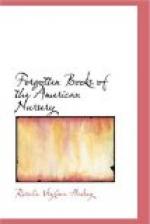FOOTNOTES:
[45-A] Field, The Child and his Book, p. 223.
[51-A] Welsh, Bookseller of the Last Century, pp. 22, 23.
[52-A] Foster, Life of Goldsmith, vol. i, p. 244.
[54-A] Welsh, Bookseller of the Last Century, p. 109.
CHAPTER III
1750-1776
Kings should be good
Not men of blood.
The New England Primer, 1791
If Faith itself has different dresses
worn
What wonder modes in wit should take their turn.
POPE: Essay on Man
CHAPTER III
1750-1776
Newbery’s Books in America
In the middle of the eighteenth century Thursdays were red-letter days for the residents of the Quaker town of Philadelphia. On that day Thomas Bradford sent forth from the “Sign of the Bible” in Second Street the weekly number of the “Pennsylvania Journal,” and upon the same day his rival journalists, Franklin and Hall, issued the “Pennsylvania Gazette.”
On Thursday, the fifteenth of November, seventeen hundred and fifty, Old Style, the good people of the town took up their newspapers with doubtless a feeling of comfortable anticipation, as they drew their chairs to the fireside and began to look over the local occurrences of the past week, the “freshest foreign advices,” and the various bits of information that had filtered slowly from the northern and more southern provinces.
On this particular evening the subscribers to both newspapers found a trifle more news in the “Journal,” but in each paper the same domestic items of interest, somewhat differently worded. The latest news from Boston was that of November fifth, from New York, November eighth, the Annapolis item was dated October tenth, and the few lines from London had been written in August.
The “Gazette” (a larger sheet than the “Journal”) occasionally had upon its first page some timely article of political or local interest. But more frequently there appeared in its first column an effusion of no local color, but full of sentimental or moral reflections. In this day’s issue there was a long letter, dated New York, from one who claimed to be “Beauty’s Votary.” This expressed the writer’s disappointment that an interesting “Piece” inserted in the “Gazette” a fortnight earlier had presented in its conclusion “an unexpected shocking Image.” The shock to the writer it appears was the greater, because the beginning of the article had, he thought, promised a strong contrast between “Furious Rage in our rough Sex, and Gentle mildness adorn’d with Beauty’s charms in the other.” The rest of the letter was an apostrophe to the fair sex in the sentimental and florid language of the period.
To the women, we imagine, this letter was more acceptable than to the men, who found the shipping news more to their taste, and noted with pleasure the arrival of the ship Carolina and the Snow Strong, which brought cargoes valuable for their various industries.




